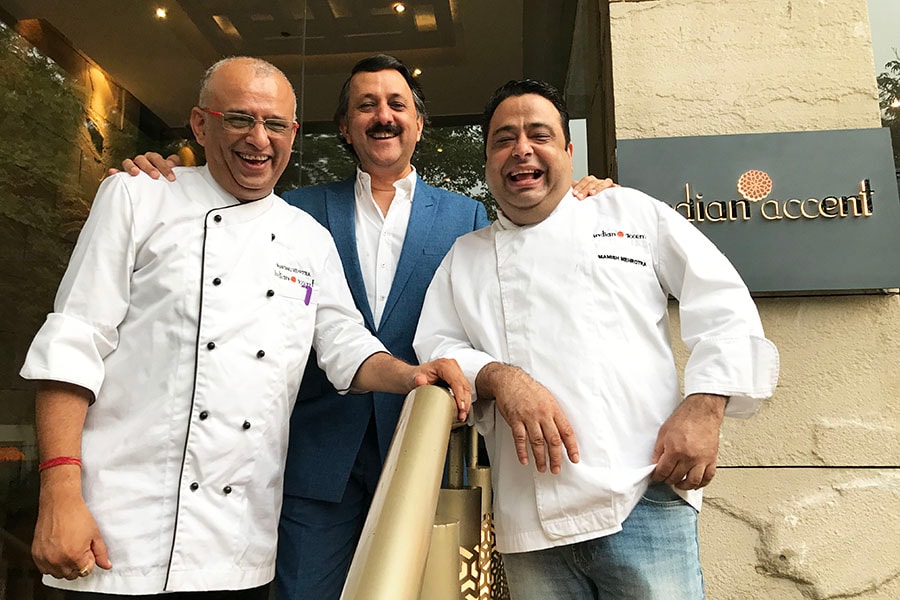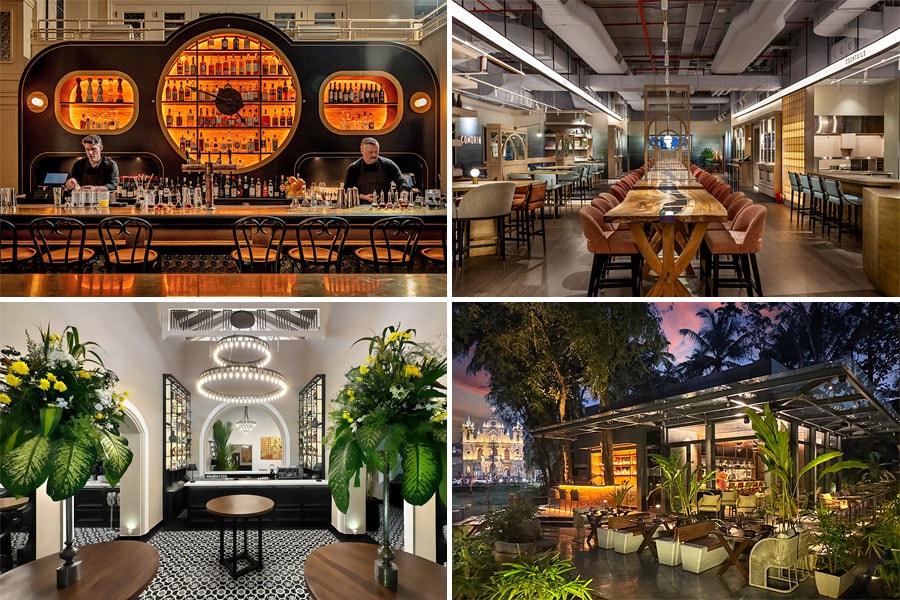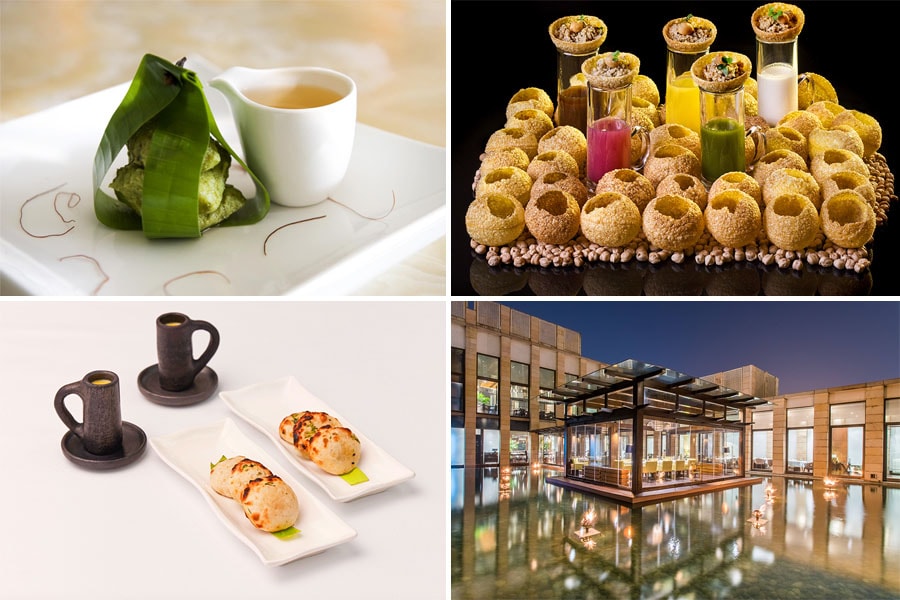Manish Mehrotra and his 'modern-Indian' legacy
As Mehrotra's collaboration with restauranteur Rohit Khattar ends after 15 years, a pool of new talent will take over Indian Accent, amid EHV International's plans to open nine restaurants this year
 (L to R) Restaurateur Rohit Khattar with chefs Manish Mehrotra (right) and Shantanu Mehrotra (left). The team has been behind Indian Accent's stellar success for 15 years and redefined "modern Indian" food.
(L to R) Restaurateur Rohit Khattar with chefs Manish Mehrotra (right) and Shantanu Mehrotra (left). The team has been behind Indian Accent's stellar success for 15 years and redefined "modern Indian" food.
It was exactly 15 years ago, on a hot June afternoon that I first met chef Manish Mehrotra, now regarded as India’s most path-breaking chef, the father of ‘modern Indian’ gastronomy.
It was 2009. Bukhara ruled the roast, Varq was the buzz. But in the kitchens of India Habitat Centre, New Delhi, chef Manish Mehrotra, a Thai chef, known to just a few people from his stints at Oriental Octopus at the Habitat and Tamarai in London, was pottering away.
Mehrotra had invited me that afternoon to sample a few new dishes he had invented. Emerging from an ophthalmologist’s appointment, with a pupil so dilated that I could barely open an eye, I walked into Oriental Octopus as Mehrotra brought out his first prototype of what would be Indian Accent food. There was that tamarind seabass, a work-in-progress then, that would become a widely recognised dish soon. A month later, restaurateur Rohit Khattar opened Indian Accent at the Manor in a leafy New Delhi neighbourhood, and the rest as they say is history. Rohit Khattar's EHV international is embarking on a period of rapid growth. This year itself, nine new restaurants are planned, including a fourth Indian Accent in an international location and other brands such as Fireback (a thai restaurant in collaboration with David Thompson), the Uber successful bar-restaurant Comorin, the south Indian Hosa, and the New York bred Koloman all set to come up in multiple locations in India and abroad.
Rohit Khattar's EHV international is embarking on a period of rapid growth. This year itself, nine new restaurants are planned, including a fourth Indian Accent in an international location and other brands such as Fireback (a thai restaurant in collaboration with David Thompson), the Uber successful bar-restaurant Comorin, the south Indian Hosa, and the New York bred Koloman all set to come up in multiple locations in India and abroad.
Matching millennial aspirations
Indian Accent broke new ground a decade and a half ago by ushering in a kind of inventive Indian food that matched the globalised aspirations of millennials with money. While the presentation was quirky and tongue-in-cheek, and the recipes boasted luxury imported ingredients (think foie gras-filled galauti, sea bass tikka, and of course the blue cheese naan), the elevated preparations were still cooked with nuance and regional flavours combined flawlessly, thanks to Mehrotra’s palate and talent both rooted firmly in a very Indian milieu.Although the restaurant wasn’t immediately commercially successful, Mehrotra himself was recognised fairly early into his innings as a creative genius; his flavours setting him apart from others who had made similar ‘modern Indian’ attempts, primarily in London, a few years before him. If that food had come across as a bit ‘Frenchified' and restrained on spices, pandering perhaps to a White audience, Mehrotra’s was food that the Indian millennial could appreciate. Global and yet desi; nothing felt laboured or force fitted, something that chefs making their individualistic brands of hyperlocal Indian food could perhaps learn even today.
As Mehrotra quits the brand that turned him into a celebrity, his food into the new Indian cuisine that everyone enjoys equally, and which paved the way for a new generation of Indian chefs trying to reinvent regional Indian foods, an era has truly passed. It’s a watershed moment for Indian gastronomy.
Also read: Indian Accent x Naar: What's on the plate when chefs Manish Mehrotra and Prateek Sadhu join forces
Khattar’s expansion spree
While the chef is yet to decide what he will do next, his friends in the industry are quick to quip that there will be a whole ‘swayamvar’ of investors looking to bag the talent! When I mention this, he laughs, dismissing the rumours, including one about him opening a chain of chaat shops! “Even while I was at the restaurant, there would be an offer or two a week,” he grins. “But I wanted to travel, take a break with my daughter,” he says, just back from a two-week holiday in Japan, from where he messaged to say “eating, eating, eating” and send us representative pictures.“Manish has won every possible award, achieved every milestone, cracked every glass ceiling and left Indian Accent as the country’s top restaurant not just on award lists but in terms of revenue generation and profitability. He is entitled to his own journey now,” says Khattar, whose EHV International owns the brands Indian Accent and Comorin, of which Mehrotra has been culinary director. “He will always be a part of our family. And I have told him that he has the full right to check any chef in the group if he sees them lag.”
Even as the star chef moves on, Khattar is set to open a fourth Indian Accent (after Delhi, New York and Mumbai) in an international location in the next few months. In fact, EHV International is on a rapid expansion spree with nine restaurants planned this year, including an ambitious reopening of the Kashmiri speciality Chor Bizarre at the historic Broadway Hotel on Asaf Ali Road in Delhi. This was Khattar’s first restaurant, and one that shut during the Covid-19 pandemic. An upgraded avatar is set to open this August.
“We are opening five Comorins, four Hosas, six Firebacks, six Chor Bizarres and five American Diners in India and internationally in the next two years”, reveals Khattar, tight-lipped on the venues for now, but both Mumbai and Hyderabad should see a couple of openings in the next few months. With the Anand Mahindra (and others)-backed EHV International being cash rich and debt-free, and working on business models where partner developers put in the capex, Khattar says EHV is on course to double or triple the number of restaurants its operates every year. This would perhaps make it the most ambitious expansion for a restaurant company in the upscale casual dining space.
 Indian Accent's star dishes such as the sea bass in moilee sauce, the miniscule gol gappas with different waters in test tubes and blue cheese naan are instantly recognisable and have been copied ad nauseum in the last decade.
Indian Accent's star dishes such as the sea bass in moilee sauce, the miniscule gol gappas with different waters in test tubes and blue cheese naan are instantly recognisable and have been copied ad nauseum in the last decade. Grooming kitchen talent
One of the biggest achievements, aside from helming India’s most famous restaurant, of the Khattar-Mehrotra collaboration has been grooming restaurant talent. If there is an ‘ITC school’, a ‘Taj school’ and an ‘Oberoi school’ for hotels, for India’s booming standalone restaurants and bars, it is the ‘Indian Accent school’ that provides not just vaunting rights but catchment areas for recruiters. In Bikaner, a few years ago, coming across copycat dishes from Indian Accent and Comorin, I asked to meet the chef in charge, who turned out inevitably to have worked in these kitchens for a few months.There are other famous alumni. Chef Himanshu Saini, one of the two most successful global Indian chefs (his Tres Ind Studio in Dubai is ranked 13 on this year’s The World’s 50 Best List, making it the second-highest ranking Indian restaurant globally) is a Mehrotra protegee. Saurabh Udinia, who helmed Revolver in Singapore (and was with Farzi Café London and Masala Library Delhi before that) also started with Indian Accent.
In India, standalone restaurants with ex-Indian Accent chefs and managers are too many to count. And, in fact, Khattar had earlier mentioned to me how he finds it both endearing and embarrassing when the hospitality at other establishments gets extra thanks to this network. Recently, a hotel in BKC (Mumbai’s?) recreated Indian Accent’s star dishes, including the gol gappas and water in test tubes, as room amenities for Khattar.
EHV International runs a coveted four-year ‘chefs in training’ programme, where fresh graduates are trained in restaurant kitchens “with the highest salary for the rung in the industry”. It is this pool of talent that should stand Khattar and company in good stead as they expand furiously.
As for who next after Mehrotra, the various Indian Accents are well settled for now: Executive chefs Shantanu Mehrotra (Delhi), Rijul Gulati (Mumbai) and Raveesh Kapoor (New York) head the three outlets, while chef Hitesh Lohat, who is Shantanu Mehrotra’s deputy in Delhi, is ready to take over the slated new opening. His style of cooking is reportedly somewhat different from his mentor’s and he may exercise some creative freedom with that. How the food changes, or doesn’t, remains to be seen. But new talent is always the way for cuisines to evolve and a legacy to live on.

















